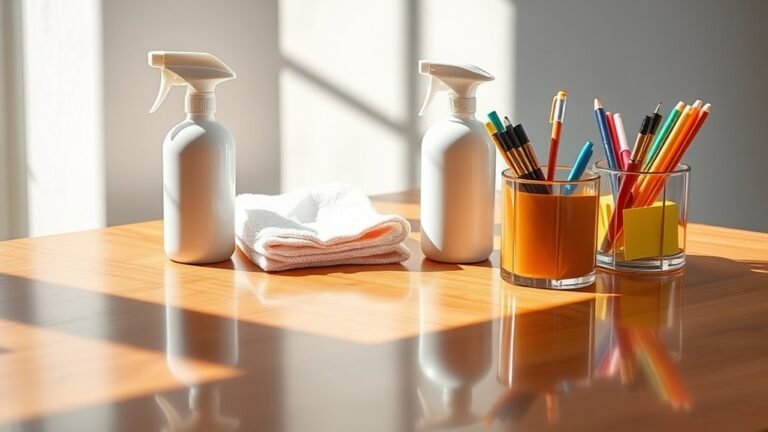Tips for Keeping Your Office Kitchen Hygienic
To keep your office kitchen hygienic, set up a regular cleaning schedule that involves everyone, including wiping surfaces and cleaning appliances frequently. Encourage proper food storage by labeling items and rotating them to avoid spoilage. Make sure there are enough cleaning supplies accessible and promote consistent handwashing with visible reminders. Don’t forget to promptly dispose of trash and establish rules for shared kitchenware. Following these basics keeps things fresh and safe, and there’s more you can do to enhance kitchen hygiene further.
Establish a Regular Cleaning Schedule

To keep your office kitchen hygienic, you should establish a regular cleaning schedule that everyone follows. Setting the right cleaning frequency helps prevent buildup of dirt and germs, ensuring a fresh space without overwhelming anyone. You don’t have to micromanage this—task delegation is key. Assign specific duties to different team members or create a rotating roster, so responsibility is shared fairly. This way, no one feels trapped by chores, and everyone enjoys a cleaner kitchen without sacrificing their freedom. Clear expectations and consistent timing make it easier for everyone to stick to the plan. By balancing regular cleaning with flexible task delegation, you maintain hygiene effortlessly while respecting each person’s independence and time.
Encourage Proper Food Storage
Food storage plays an essential role in keeping your office kitchen clean and safe. To maintain freedom and prevent messes, use clear labeling systems so everyone knows what’s inside and when it expires. Implement food rotation practices—first in, first out—to minimize waste and avoid spoiled items lingering in shared spaces. Here’s a quick guide:
| Task | Tip |
|---|---|
| Labeling systems | Use date and name labels |
| Food rotation | Arrange older items upfront |
| Storage | Keep raw foods separate |
| Containers | Use airtight, reusable containers |
| Cleanliness | Regularly discard expired items |
Following these steps helps you keep control over your food, reduce clutter, and enjoy a hygienic kitchen without unnecessary restrictions.
Provide Adequate Cleaning Supplies

One key to maintaining a hygienic office kitchen is making sure you have enough cleaning supplies readily available. When everyone can easily grab what they need, it empowers all to take responsibility for cleanliness without hassle. Stock your kitchen with essential cleaning supplies like sponges, dish soap, and disposable wipes. Don’t forget sanitizing products—these are vital for killing germs on countertops and shared surfaces. Keep these items in a clearly marked, accessible spot so no one wastes time searching. By providing the right tools, you reduce the risk of bacteria spreading and keep the space fresh. When cleaning supplies are within reach, it encourages a culture of freedom and accountability, letting everyone contribute to a safer, more pleasant kitchen environment.
Promote Hand Hygiene Among Employees
Although it might seem simple, promoting hand hygiene among employees plays an essential role in keeping your office kitchen clean and safe. You want to encourage everyone to use handwashing stations frequently, especially before handling food. Placing clear hygiene reminders nearby helps keep this habit top of mind without feeling restrictive. Here’s a quick guide to promoting hand hygiene:
| Action | Location | Frequency |
|---|---|---|
| Use handwashing stations | Near kitchen entry | Before meals |
| Follow hygiene reminders | On fridge and doors | Daily |
| Encourage peer reminders | Break area | Ongoing |
Maintain Appliances and Equipment

To keep your office kitchen hygienic, you need to stick to a regular cleaning schedule for all appliances and equipment. Make sure everyone uses them properly to avoid damage or contamination. Don’t forget to perform timely maintenance checks to catch issues before they become problems.
Regular Cleaning Schedule
Since appliances and equipment are used daily in the office kitchen, you’ll need a regular cleaning schedule to keep them functioning well and hygienic. Start by setting a clear cleaning frequency for each item—some may need daily wiping, while others can be cleaned weekly. This keeps everything running smoothly without overwhelming you or your team. Don’t hesitate to use task delegation to share the responsibility; assigning specific tasks to different people encourages teamwork and guarantees nothing gets missed. Creating a simple checklist helps everyone stay on track and makes the process feel less like a chore. By sticking to this routine, you free yourself and your coworkers from unexpected breakdowns or hygiene issues, allowing everyone to enjoy a clean, hassle-free kitchen space.
Proper Appliance Usage
When you use office kitchen appliances properly, you’ll not only extend their lifespan but also keep them safe and hygienic for everyone. Practicing good appliance safety and kitchen etiquette guarantees a smooth, worry-free experience for all. Always follow manufacturer instructions, avoid overloading devices, and clean spills immediately to prevent damage or hazards. Respect shared spaces by leaving appliances clean and ready for the next person.
| Appliance | Key Usage Tip |
|---|---|
| Microwave | Cover food to avoid splatters |
| Coffee Maker | Clean filters regularly |
| Refrigerator | Store items properly |
| Toaster | Remove crumbs after use |
Timely Maintenance Checks
Although proper appliance usage is essential, keeping your office kitchen hygienic also depends on timely maintenance checks. You’ll want to schedule regular safety inspections to guarantee every appliance runs smoothly and meets health regulations. Skipping these checks can lead to unnoticed malfunctions, increasing risks of contamination or accidents. By staying proactive, you not only protect everyone’s well-being but also extend the life of your equipment. Don’t wait for a breakdown—set reminders for maintenance and keep a log of inspections. This way, you maintain a clean, safe kitchen environment without feeling restricted. Freedom in the office kitchen means knowing your appliances are safe and reliable, allowing you to focus on what truly matters: enjoying your space worry-free.
Dispose of Trash Promptly and Properly
You should always use designated bins for your trash to keep the kitchen tidy and organized. Don’t wait too long to empty them, as overflowing bins can attract pests and cause odors. Make sure to seal bags properly before disposal to prevent spills and maintain cleanliness.
Use Designated Bins
Three simple steps can help you keep your office kitchen clean: use designated bins, dispose of trash promptly, and do it properly. To embrace effective recycling practices and enjoy a clutter-free space, follow these guidelines:
- Choose clearly labeled bins for trash, recycling, and compost to make sorting effortless.
- Place bins in accessible spots where everyone can easily reach them, encouraging consistent use.
- Respect bin purpose by tossing waste only in its designated container to prevent contamination and keep the kitchen fresh.
Empty Regularly and Seal
Many office kitchens benefit from emptying trash bins regularly to prevent odors and overflow. You don’t want your space smelling stale or looking cluttered, so make it a habit to dispose of waste promptly. Always replace liners with sealed bags to trap odors and keep pests away. When tossing out leftovers or food scraps, make sure to use empty containers before sealing to avoid spills. This simple routine preserves a fresh environment and encourages everyone to respect the shared space. Taking charge of trash disposal not only keeps things hygienic but also grants you the freedom to enjoy a clean, inviting kitchen without unnecessary hassle. By committing to empty regularly and seal properly, you help maintain a healthier, more pleasant workspace for all.
Implement Rules for Shared Kitchenware
Clear guidelines for shared kitchenware are essential to keep your office kitchen hygienic and organized. When everyone respects the rules, you all enjoy a cleaner, freer space. Start by:
- Labeling shared utensils and communal dishes clearly, so no one takes what isn’t theirs by mistake.
- Establishing a rule that all shared items must be washed immediately after use to prevent germs from spreading.
- Encouraging everyone to report broken or dirty kitchenware to keep replacements timely and the kitchen safe.
Educate Staff on Kitchen Hygiene Best Practices
Following rules for shared kitchenware helps maintain order, but everyone’s habits play a big role in keeping the kitchen hygienic. To empower your team, organize kitchen workshops that focus on practical hygiene tips and encourage questions. These sessions create a relaxed space where staff can learn and share their own ideas without feeling restricted. Providing easy-to-understand hygiene manuals is another great move—they serve as quick references that reinforce best practices without overwhelming anyone. When you take the time to educate your staff on kitchen hygiene best practices, you’re not just setting rules; you’re building a culture where everyone feels responsible and free to contribute. This collective effort keeps the office kitchen safe, clean, and enjoyable for all.
Frequently Asked Questions
How Can I Prevent Mold Growth in the Office Kitchen Fridge?
To prevent mold growth in the office kitchen fridge, you’ll want to focus on fridge organization and temperature control. Keep everything tidy and avoid overcrowding, so air can circulate freely. Make sure the temperature stays between 35-38°F to slow mold growth. Regularly check and toss expired or spoiled items, and wipe down shelves with a mild cleaner. Staying on top of this helps you enjoy a fresh, mold-free fridge without hassle.
What Are the Best Non-Toxic Disinfectants for Kitchen Surfaces?
If you’re looking for the best non-toxic disinfectants for kitchen surfaces, natural cleaners are your go-to. They’re effective surface sanitizers without harsh chemicals, keeping your space safe and fresh. Consider options like vinegar, baking soda, or hydrogen peroxide — all great for cutting germs naturally. You’ll love how these cleaners let you maintain a hygienic kitchen while staying true to your desire for freedom from toxins and synthetic ingredients.
How Often Should Office Kitchen Towels Be Replaced?
You should prioritize kitchen towel hygiene by replacing towels frequently—ideally every day or at least a few times a week. This towel replacement frequency helps prevent bacteria buildup and keeps your office kitchen fresh. Don’t let damp, used towels hang around; they can quickly become breeding grounds for germs. Staying on top of this simple habit lets you enjoy a cleaner, freer workspace without worrying about hidden messes lurking on your towels.
Can Air Purifiers Improve Office Kitchen Hygiene?
When it comes to keeping things fresh and inviting, air purifiers can be your secret weapon. They boost air quality by filtering out unwanted particles and play a key role in odor elimination, making your office kitchen feel more welcoming. If you value a space where everyone breathes easy and enjoys freedom from lingering smells, investing in a good air purifier is a smart move. It’s about creating a healthier environment for all.
What Are Safe Practices for Microwaving Shared Meals?
When microwaving shared meals, you’ll want to follow microwave etiquette to keep things safe and respectful. Always cover food to avoid splatters and prevent cross-contamination. Heat meals thoroughly to kill any bacteria, and use clean utensils when handling shared dishes. Label your food clearly, so everyone knows what’s theirs, and avoid reheating others’ meals without permission. These simple steps guarantee shared meal safety while keeping your freedom to enjoy the office kitchen.






